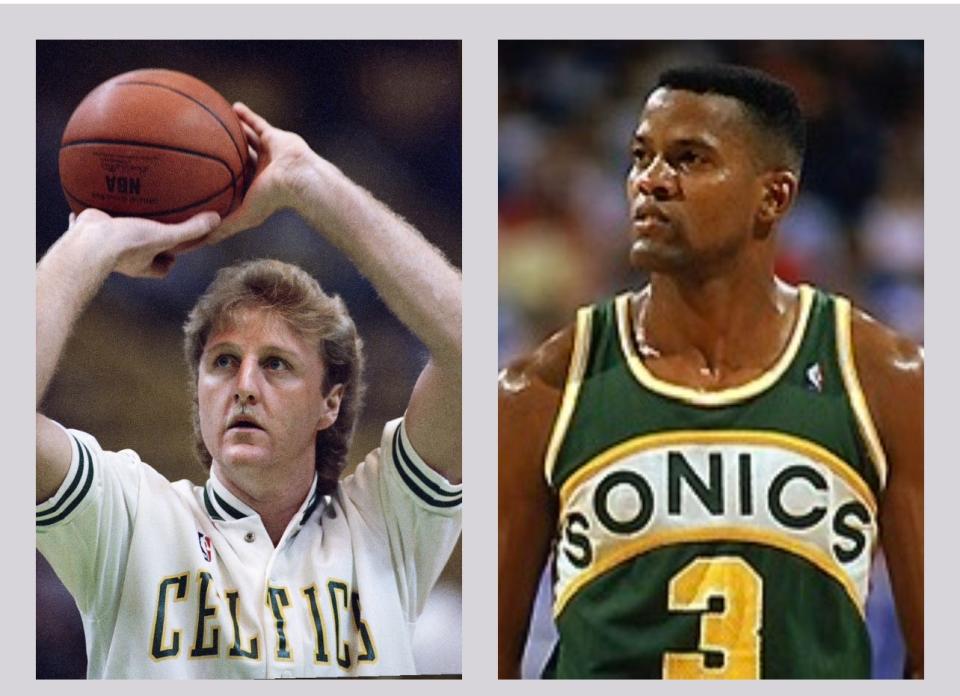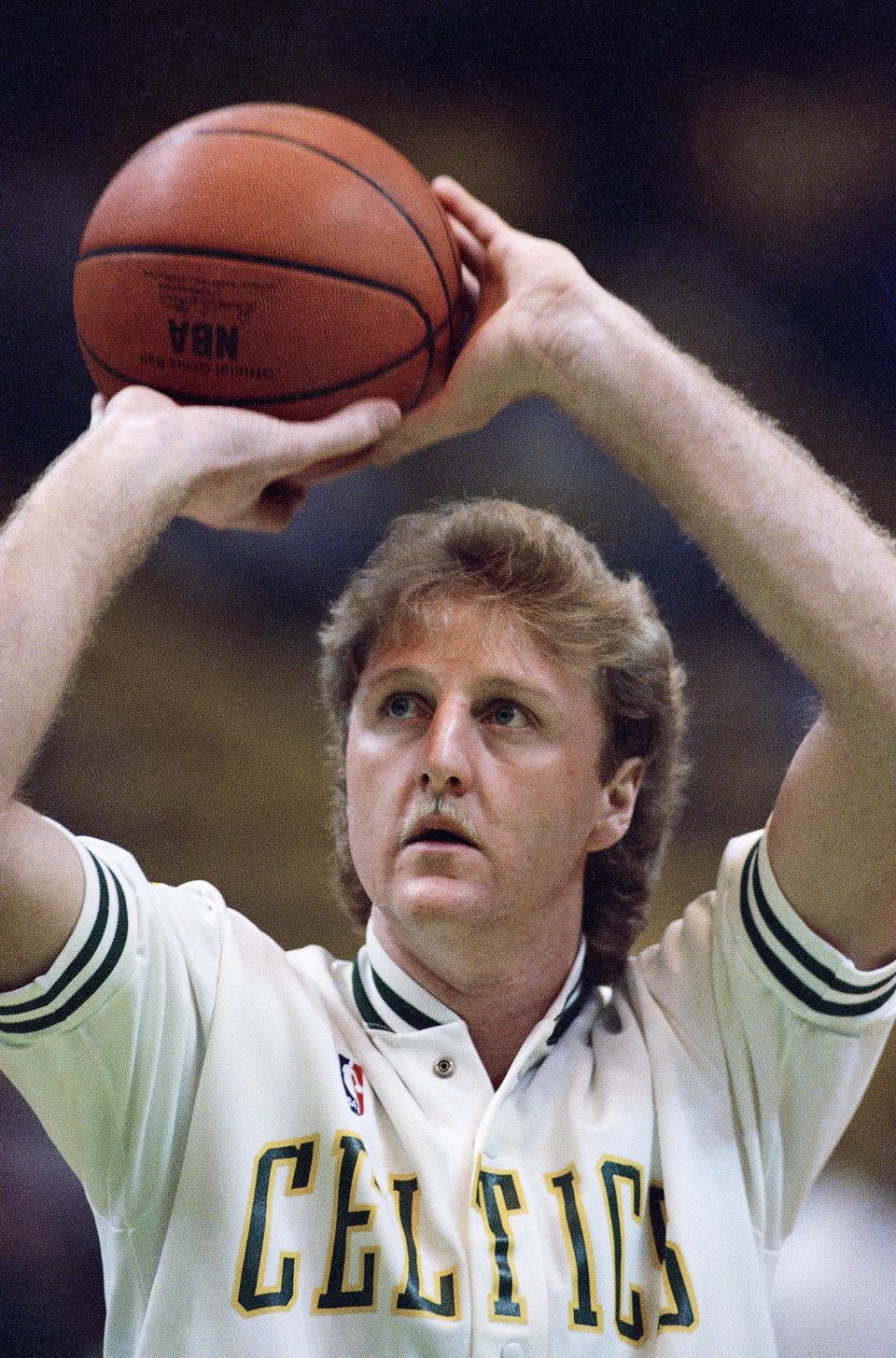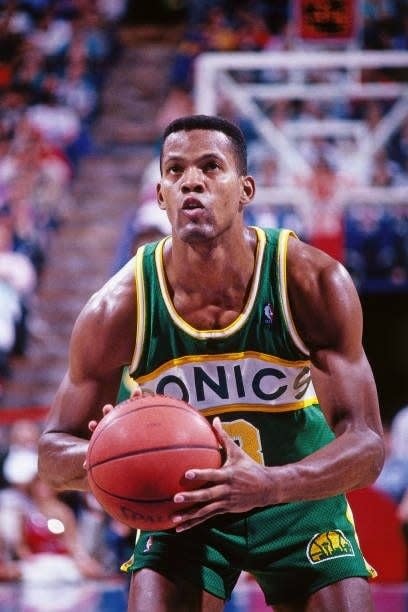'Lucky Larry' Bird beat Dale Ellis in 3-point contest after asking 'Who's coming in 2nd?'
INDIANAPOLIS -- Mostly what Dale Ellis remembers is how badly he wanted to put Larry Bird in his place. How when Ellis won the coin toss before the final round of the 3-point contest in 1988, he was adamant he wanted to go first so he could rack up a massive, intimidating score that would leave Bird squirming.
All Ellis wanted to do -- after what had happened in the NBA All-Star locker room at Chicago Stadium minutes before the 3-point contest in 1988 -- was to put the two-time reigning champ, a cocky incumbent at that, in his place.
Instead, Ellis became the famous loser in what is perhaps the most famous quote to ever come out of an NBA All-Star competition.
The exact words of the quote vary, depending on which guy in that locker room talks, but the meaning is exactly the same. "Which one of you guys is playing for second?" Ellis remembers Bird saying to his opponents in the locker room. "Man, who's coming in second?" Craig Hodges recalls the words of Bird's trash talk in his book "Long Shot."

Bird's words came out of the blue. No one was even talking in the locker room. All the 3-point contest competitors were stretching, trying to get loose, said Ellis.
"Back then, there was not like this friendly locker room where we're sitting there chatting and hugging it up," Detlef Schrempf, who was playing for the Mavericks at the time, told IndyStar last week. "So, it was a little bit of a different interaction then."
Even Bird — who IndyStar requested an interview with through the Pacers and did not get a response — says he doesn't know what came over him.
"I don't know why I (said it), but I did. Everybody was sitting there not saying a word," Bird told IndyStar in 2017. "It just came out. Thank God I won."
Thank God for Bird, said Ellis.
As he looked around at his competitors in that locker room, Ellis said he saw a bunch of stars. Hodges with Milwaukee, the Lakers' Byron Scott, Mark Price of Cleveland, the Celtics' Danny Ainge, Trent Tucker with the Knicks and Schrempf.
"All the guys in the locker room, I thought, had a chance to win that contest," Ellis told IndyStar. "But Larry walks in and says, 'Which one of you guys is playing for second?' I didn't quite like it. I didn't like what he said, so I wanted to really embarrass him."
Instead, Bird beat Ellis in the final round, taking the last shot and walking away from the line with his finger in the air -- before the ball even dropped in.
35 years ago today, LARRY BIRD walked into the All-Star locker room & said: "Who's coming in second?"
He backed up his trash-talking by winning his 3rd straight championship & putting his hand up before the last shot went in...with his warm-up jacket still on! pic.twitter.com/XHTlrTKfRE— Ballislife.com (@Ballislife) February 6, 2023
'He is like a machine'
To be fair, Bird had reason to be a little cocky. He had, after all, won the previous two Long Distance Shootouts in 1986 and 1987, what the 3-point contest was called in its early days. Winning the third, in Bird's mind, was likely a given. Bird had never been one to suffer from insecurities.
As Bird shot his way through that 1988 competition, Michael Jordan (who won that year's All-Star slam dunk contest) stood in the bowels of the stadium watching on a small television set as Bird shot with his warmup jacket still on.
"He didn't take off his top yet," Jordan said on the television broadcast, smiling, with an incredulous look on his face. "I'd hate to see when he takes off his top."
The 3-point contest has three timed rounds. There are five balls in five racks at different spots on the court. The first four balls of each rack are worth one point with the final, red-white-and-blue ball in each rack worth two points, making the highest possible score in each round 30 points.
"Look at that smooth rhythm," the TV announcers fawned over Bird. "The shot, one step back, pick it up, the shot, back and forth. He is like a machine and the results are almost like a machine."

As Ellis and Bird headed to the final round in 1988 and, as Ellis won the coin toss, at first he wanted to shoot last.
"And then I changed my mind at the last second and said, 'No, I'm going to go first' because I wanted to embarrass him," Ellis said. "See if he can catch me.
"Wrong thing to do. Wrong thing to do. Because he's always been a clutch player."
It didn't look like Bird would be clutch, at first, scoring just seven of 18 possible points in the first three racks of the final round. He needed to beat Ellis' 15 points to win.
But with two racks left and 25 seconds on the clock, Ellis watched clutch take over. Bird made the first four balls of the next rack, then the two-point ball to reach 13 points. At the final rack, he missed the first two balls, then made the next two for 15 points to tie Ellis.
And then Bird drained the two-point ball for 17 points with four seconds still on the clock.
The crowd went wild. Bird walked away with a strut and his finger pointed toward the sky. He was a 3-time consecutive, 3-point contest champion.
After standing in the winner's circle, holding a $12,500 check (the winner gets $50,000 now), Bird hoisted up a massive gold trophy in the shape of a basketball as he was interviewed by a reporter. "What were you thinking after that terrible start in the final round?" Bird was asked.
"You know, I knew he just had 15 points," Bird said of Ellis' performance. "And I still had plenty of time."
'I am the 3-point king now'
Before Bird made Ellis the second-place loser in 1988, he did the same to Hodges and Schrempf in 1986 and 1987. At the NBA's inaugural Long Distance Shootout in 1986, Bird was the only All-Star member competing.
In the finals, Bird trounced Hodges 22 to 12, winning $10,000 and a trip for two to Hawaii. "I am the 3-point king now," Bird told a reporter, according to an IndyStar article. "I'd rather win the MVP, but this is more exciting. This is tougher than the slam dunk contest because everyone can jump. Not everybody can shoot 3-pointers."
But Schrempf most definitely could. He was leading the league in 3-point percentage when the 1987 contest came around. After shooting "fairly well" in the first rounds, Schrempf said he chose to go last in the finals against Bird so he could see how many points he needed to win.
"The final (round) was the worst shooting. Larry didn't do well, and I sure didn’t," said Schrempf. "I remember I started pretty poorly. I missed nine of the first 10, then I got really hot at the end."
Schrempf needed 16 to beat Bird. He got to 14 points with only one ball left, that colorful ball worth two points, to tie Bird and send the competition to an extra, shortened round. But as he took that final shot, Schrempf had lost count and wasn't sure if he had tied or beaten Bird -- or lost.
"I was on my knees watching him take that shot," Bird wrote in his book, "Drive: The Story of My Life." "And I knew when he let it go that it wasn’t going in. I had survived."
Schrempf's last shot bounced off the rim, "sending Bird to the floor with his arms up raised," according to a Feb. 8, 1987 IndyStar article. When he stood back up, he turned to Ainge and gave him a double high five.
"I looked up at the end and I couldn’t even see the scoreboard because it was behind us," said Schrempf. "Then I saw the bench and guys were congratulating Larry." Bird took home the $12,500 first prize.
"I always said if I could get past the first round, I could win," Bird said after the contest. "A guy from Seattle (where Schrempf played in college) or Dallas was sitting behind me yelling, 'You're going to choke. You're going to choke.' I knew I was going to make that rack."
On this date in 1987, Larry Bird beats Detlef Schrempf to win his second of three straight Three Point Contests. Hooray Larry Bird! pic.twitter.com/MlpT4h7mhE
— Honest☘️Larry (@HonestLarry1) February 7, 2023
Bird was asked by a reporter after, "Were you worried about Detlef in the end?"
"Well, he had the last shot and took a $12,000 shot there," Bird said smirking, "and missed it."
'We call him Lucky Larry'
Bird couldn't go for a fourth consecutive win. After having surgery to remove bone spurs in his heels, he missed almost the entire 1988-89 season. That meant he also missed the 1989 3-point contest.
Ellis was happy to step in, beating Hodges in the finals and whisking away the title from Bird.
"When he won, he beat me (in 1988), he didn't even come back," Ellis said, smiling. "He wouldn't come back."

People often think of the slam dunk and 3-point contests as a fun side show to the main event of the NBA All-Star game, but they're wrong, said Ellis.
"It's competitive. You don't want to get there and lose it," said Ellis, who now heads the Atlanta chapter of National Basketball Retired Players Association. "It takes your popularity away, takes your money-making ability away to a certain extent also. So yeah, those guys are competitive."
When asked if he held any grudges against Bird for that 1988 3-point contest or the words Bird said in the locker room beforehand, when asked if he had anything to say to Bird today ... "Hey, yeah, he got lucky," Ellis said smiling. "He got lucky. You can call him Larry Legend, (they) gave him that name for a reason. You know, he loved the situation where he was taking that final shot. He liked it in that situation. And it took him making a final shot to beat me.
"They call him Larry Legend. We call him Lucky Larry."
Follow IndyStar sports reporter Dana Benbow on X: @DanaBenbow. Reach her via email: dbenbow@indystar.com.
This article originally appeared on Indianapolis Star: Larry Bird trash talked in 1988 NBA All-Star Game 3-point contest
